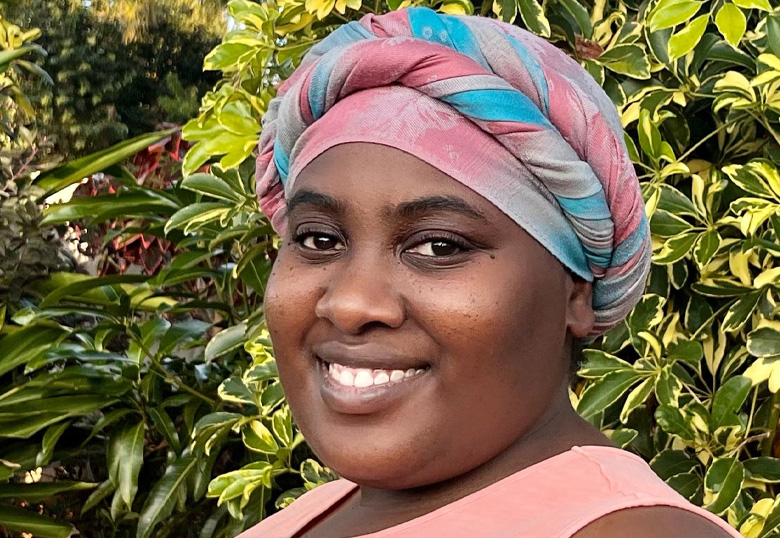Seeking to rediscover her voice, University of Toronto student Chido Muchemwa entered The University of Lethbridge’s Bridge Prize short story contest on a whim and produced the grand prize-winning submission. Her story, If It Wasn’t for the Nights, was deemed the best of 187 entries from throughout the country and earned her the $7,500 first-place award, the largest cash prize for student writing in Canada.

“When I submitted to the Bridge Prize, I never thought I would win. I did it impulsively because I felt I needed to do something to convince myself that I was indeed still a writer,” says Muchemwa, a Zimbabwean writer currently living in Canada and PhD candidate in the Faculty of Information at the U of T. “My father died in 2020, and I felt like words abandoned me.”
Muchemwa was joined by three other finalists as award winners for the biennial event. The Bridge Prize was established in 2019 by the ULethbridge School of Liberal Education and Vancouver-based alumnus and donor Terry Whitehead (BA ’94). It is Canada’s only national short story competition open exclusively to post-secondary graduate and undergraduate students studying at Canadian universities and colleges.
Each of the other three finalists, Lily Scriven (York University), Eliza Ives (University of New Brunswick), Fernando Tarini (University of Calgary), earned $1,000 prizes, while each winning author also earned $200 gift cards from major sponsor Munro’s Books. Waubgeshig Rice, who is also a juror for the 2022 Giller Prize, served on the Bridge Prize jury and is enthused about the quality of writing from the post-secondary generation.
“Serving on the Bridge Prize jury has been a major career highlight,” says Rice. “The stories submitted provided me a thorough glimpse of the exceptional talent among emerging writers in Canada today. I was captivated by the craft and content in each of the submissions, and I look forward to reading more from these gifted authors in the future!”
Muchemwa’s work was praised by juror Lisa Moore.
“The language is transparent, unadorned, and concise — an elegant piece of writing. The story is jampacked with nuanced moments, calibrations of tension and a kind of uneasy epiphany — not sentimental but ephemeral and beautifully satisfying,” she says.
For Muchemwa, whose work has appeared in Lolwe, Augur, Catapult, Baltimore Review and Bacopa Literary Review, the act of putting her ideas into a story again was cathartic.
“If It Wasn’t for the Nights is the only new story that I have been able to write since 2020,” she says. “The Bridge Prize is a much-needed confidence boost, and a reminder that the process doesn’t have to be perfect to produce good, meaningful stories.”
Muchemwa has an MFA in Creative Writing from the University of Wyoming in 2014 and has been shortlisted twice for the Short Story Day Africa Prize and placed second in the Humber Literary Review’s 2020 Emerging Writers Fiction Contest and in the 2022 Prism International Jacob Zilber Prize for Short Fiction.
Eliza Ives wrote Office Story, which was noted by juror Joan Thomas as being, “Sly and witty, it captures the soul-destroying daily realities of life in a contemporary bureaucracy. The dialogue is terrific. So expertly done — Office Story reads like a published work.”
Juror Sam Wiebe was impressed by Lily Scriven’s Women in the Morning Light.
“Thoughtful and elegantly written, clever but not flippant, with resonant themes of art, history, and female perspective,” says Wiebe. “An enviably smooth prose style.”
Fernando Tarini’s Durian Days was praised for its “Clever angle, refreshing take on grief and youth,” by juror Francesca Ekwuyasi.
About the Bridge Prize
• Established in 2019 and first awarded in 2020, a new competition will run every second year.
• Total prize money for the Bridge Prize is $10,500, with $7,500 to the winner and $1,000 each to three finalists.
• 187 stories from students attending 48 post-secondary institutions in nine provinces across Canada were entered for 2022.
• An initial group of 30 local jurors, comprised of campus and community-based academics and cultural leaders, read all 187 stories. Each story was read by a minimum of three jurors, after which the field was narrowed to the top 70. Every local juror then read each of the 70 stories before 10 were sent on to the main jury.
• The six-person main jury was comprised of authors, artists and educators Francesca Ekwuyasi, Lisa Moore, Waubgeshig Rice, Bill Richardson, Joan Thomas and Sam Wiebe.
• For more, visit the Bridge Prize web page.

